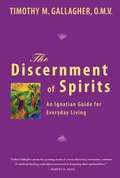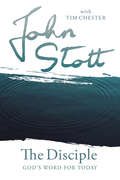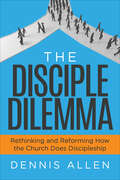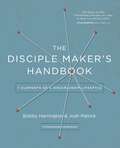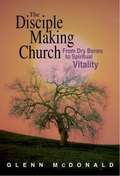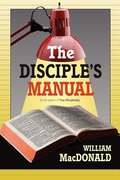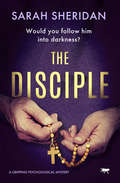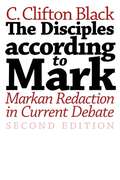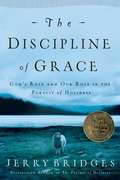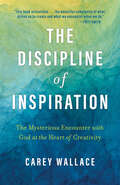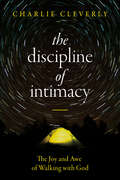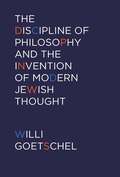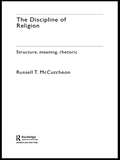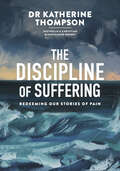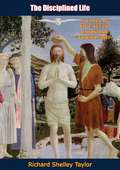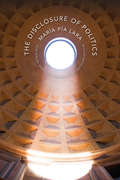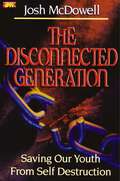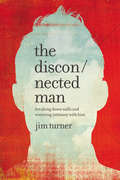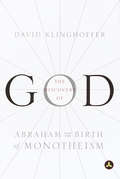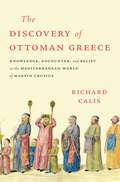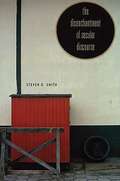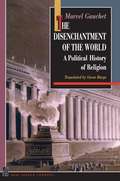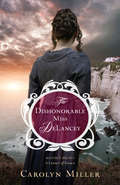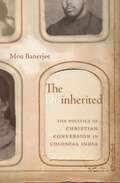- Table View
- List View
The Discernment of Spirits: An Ignatian Guide for Everyday Living
by Timothy M. GallagherSt. Ignatius Loyola, founder of the Jesuits, is one of the most influential spiritual leaders of all time, yet many readers find his Rules for Discernment hard to understand. What can Ignatius teach us about the discernment of spirits that lies at the very heart of Christian life? In The Discernment of Spirits, Fr. Timothy Gallagher, a talented teacher, retreat leader, and scholar, helps us understand the Rules and how their insights are essential for our spiritual growth today. By integrating the Rules and the experience of contemporary people, Gallagher shows the precision, clarity, and insight of Ignatius's Rules, as well as the relevance of his thought for spiritual life today. When we learn to read Ignatius correctly, we discover in his remarkable words our own struggles, joys, and triumphs. This book is for all who desire greater awareness of God's action in their daily spiritual lives, and is essential reading for retreat directors, spiritual directors, priests, and counselors.
The Disciple (God's Word for Today #Volume 2)
by John StottHow can Christians effectively engage today's world while staying true to Scripture?andThe Contemporary ChristianThe Disciple
The Disciple Dilemma: Rethinking and Reforming How the Church Does Discipleship
by Dennis AllenThe Disciple Dilemma explains the realities and limitations of using classic business logic and strategy within the Christian community and makes the case that Christian leaders must restructure their organizations to conform to Christ’s mission.
The Disciple Maker's Handbook: Seven Elements of a Discipleship Lifestyle
by Bobby William Harrington Josh Robert PatrickMany people believe that discipleship is important, but they need help. In fact, the vast majority of Christians report that they have never been personally discipled by a more mature follower of Jesus. Is it any wonder that they have a difficult time knowing how to disciple others?If making disciples of Jesus is the greatest cause on earth, how should we equip people to do it? This handbook is a practical guide for how to embrace the discipleship lifestyle – being a disciple of Jesus and how to make other disciples of Jesus. <P><P>With contributions from pastors and teachers like Francis Chan, Jeff Vanderstelt, Bill Hull, Jim Putman, KP Yohannan, and Robert Coleman, the authors present seven elements that are necessary for disciple making to occur:Jesus—the original disciple maker and centerpiece of discipleship.Holy Spirit—fuels the disciple-making process.Intentionality—making disciples utilizing a strategy and a roadmap.Relationships—creating a loving, genuine connection with others who trust and follow Jesus.Bible—using the Word of God as the manual for making disciples.Journey—forging a traceable growth story from a new birth to spiritual parenthood. <P>Multiply—reproducing the discipleship process so that the disciple becomes a disciple maker.Whether you are a parent who wants to disciple your children, a small group leader who wants to disciple those in your group, or a church leader who wants to disciple future leaders, the seven key elements in this handbook form a framework for understanding discipleship that can be applied in countless situations. In addition, there are questions provided in each section to help you think through how to apply the material to your disciple making efforts.
The Disciple Making Church: From Dry Bones to Spiritual Vitality
by Glenn McdonaldRevised and expanded edition. Is your church shrinking? Are the same people and programs being run year after year, after year? Are your church members worried about the cash in the plate and not the souls in the pews? Do you want to make a change? This is the book for you. Jesus commands us to go and make disciples of the earth. But how does one do this, and what if you aren't sure what kind of a disciple you might make. McDonald explains the 6 traits of a disciple and the marks of a disciple making church.
The Disciple's Manual
by William MacdonaldThe Disciple's Manual is pure, undiluted Christianity.What every disciple is called to is as radical as it comes. For more than half a century, practicing and proclaiming biblical discipleship has been the author's heart-beat. This is that life's ministry captured for you in a book. Hundreds of practical helps on the key issues: <P>The Revolutionary Teachings of Jesus <P>He Said, "Forsake All" <P>The Sin No One Confesses <P>The Challenge of Personal Evangelism <P>Keep Yourself Pure <P>Your Daily Time with Jesus <P>One-On-One Discipleship<P>. . . <P>and much more
The Disciple: A Gripping Psychological Mystery (The Sister Veronica Mysteries #2)
by Sarah SheridanSister Veronica returns in the sequel to The Convent. “Such a good read . . . a cosy mystery but has, like Christie’s Miss Marple books, a very dark side.” —Love Books, Read BooksWould you follow him into darkness?Sister Veronica is back at the Convent; a changed woman as a result of her experiences with the corrupt clergy and the murder she lived through.Now—more than ever—she has a thirst for righting wrongs, even if it means getting herself into danger.So, when a two-month-old baby girl is left on the Convent doorstep one night, wrapped up in dirty blankets and placed in an open cardboard box, Sister Veronica steps in to help solve the mystery.And when she discovers a tarot card left with the baby, she is drawn deeper into the search for the mother.Sister Veronica sets out on a mission to discover the truth, and in doing so begins to peel back the layers of secrecy and lies. But is she really prepared for what she’ll discover?Praise for the Sister Veronica Mysteries“A fast-moving psychological thriller about murder and corruption within the Roman Catholic Church.” —Crime Fiction Lover“I love Sister Veronica! This book was not what I was expecting, but I really enjoyed it. The mystery is compelling and keeps becoming more so as Sister Veronica and her friends discover the depth of the corruption and willingness to kill to cover it up.” —Avonna Loves Genres“These are most definitely books with their own, unique stories and characters. They are well worth reading, well written and very engaging.” —Love Books, Read Books
The Disciples according to Mark: Markan Redaction in Current Debate, Second Edition
by C. Clifton BlackRedaction criticism attempts to identify biblical authors' theological interests by examining their adaptation of sources. Focusing on representative studies of Jesus' disciples in the Gospel of Mark, this pioneering book by C. Clifton Black has become the standard evaluation of that method's exegetical reliability.Comprehensively reviewing recent scholarship, Black identifies three distinctive types of redaction criticism in Markan interpretation. He demonstrates that diverse redaction-critical interpretations of the disciples in Mark have bolstered rather than controlled scholarly presuppositions to a degree that impugns the method's reliability for interpreting Mark. The book concludes by assessing redaction criticism's usefulness and offering a more balanced approach to Mark's interpretation.This second edition includes a substantial, detailed afterword that revisits the book's primary issues, converses with its critics, and provides an update of Markan scholarship over the past twenty-five years.
The Discipline of Grace: God's role and Our role in the Pursuit of Holiness
by Jerry BridgesThe Discipline of Grace offers a clear and thorough explanation of the gospel and what it means to be a believer. This book explores how the same grace that brings us to faith in Christ also disciplines us in Christ. In learning more about grace, you also will learn about God's character, His forgiveness, and the Holy Spirit.
The Discipline of Inspiration: The Mysterious Encounter with God at the Heart of Creativity
by Carey WallaceLearn where inspiration comes from and how to harness it in your life and work. We all know the sensation of inspiration. It&’s what tells a painter what to paint and a singer how to sing—and what prompts us to throw a new spice into an old recipe. But what is inspiration? When we train artists, we typically identify them by their talent and train them in technique. We talk very little about the crucial creative spark of inspiration. Where does it come from? What does it want from us? How can we get more of it? In The Discipline of Inspiration, Carey Wallace meditates on this vital spark and on the ways artists have negotiated with it across genres and throughout history. She also offers practical methods—including silence, community, and rest—to help everyone access more inspiration, more often. Artists will develop a fresh perspective on inspiration and learn new tools for their creative practice. And readers from all walks of life will discover the transformative power of inspiration in every aspect of their lives.
The Discipline of Intimacy: The Joy and Awe of Walking with God
by Charlie CleverlyPeople who pray are those who break through, who hold on, who stand in the gap, who will not be silent and even who change history. But they are also those who wait in the silence, sometimes in the sorrows—who ‘stand in the council of the Lord’, who contemplate his beauty and stand in awe. We need both! This book looks at the dynamic paradox of prayer: knowing how to be still and silent but also how to plead and speak. Knowing how to let go but also how to hold on. Charlie Cleverly calls this ‘the Discipline of Intimacy’. Learning this can be to learn to love God, walk with him, be changed in yourself and even—as we see for so many moving examples in this book—help change the world. Includes questions for small groups and personal reflection. Watch the accompanying videos at www.disciplineofintimacy.com.
The Discipline of Philosophy and the Invention of Modern Jewish Thought
by Willi GoetschelExploring the subject of Jewish philosophy as a controversial construction site of the project of modernity, this book examines the implications of the different and often conflicting notions that drive the debate on the question of what Jewish philosophy is or could be.The idea of Jewish philosophy begs the question of philosophy as such. But “Jewish philosophy” does not just reflect what “philosophy” lacks. Rather, it challenges the project of philosophy itself.Examining the thought of Spinoza, Moses Mendelssohn, Heinrich Heine, Hermann Cohen Franz Rosenzweig, Martin Buber, Margarete Susman, Hermann Levin Goldschmidt, and others, the book highlights how the most philosophic moments of their works are those in which specific concerns of their “Jewish questions” inform the rethinking of philosophy’s disciplinarity in principal terms.The long overdue recognition of the modernity that informs the critical trajectories of Jewish philosophers from Spinoza and Mendelssohn to the present emancipates not just “Jewish philosophy” from an infelicitous pigeonhole these philosophers so pointedly sought to reject but, more important, emancipates philosophy from its false claims to universalism.
The Discipline of Religion: Structure, Meaning, Rhetoric
by Russell T. McCutcheonThe Discipline of Religion is a lively critical journey through religious studies today, looking at its recent growth as an academic discipline, and its contemporary political and social meanings. Focusing on the differences between religious belief and academic religious discourse, Russell T. McCutcheon argues that the invention of religion as a discipline blurs the distinction between criticism and doctrine in its assertion of the relevance of faith as a credible object of study. In the leap from disciplinary criticism to avowal of actual cosmic and moral meaning, schools of religious studies extend their powers far beyond universities and into the everyday lives of those outside, managing and curtailing specific types of speech and dissent.
The Discipline of Suffering: Redeeming Our Stories of Pain
by Katherine ThompsonFrom the author of the bestseller Christ-Centred Mindfulness, a transformative book that tackles the faulty stories we tell ourselves during times of pain and suffering.Katherine Thompson shows how suffering can be a spiritual discipline, fostering growth, healing and a deeper faith in God. Her book provides a safe space to explore the difficult questions raised by suffering while encouraging us to confront personal challenges rather than avoid them.The Discipline of Suffering offers practical strategies, real-life stories and useful skills to help reconstruct broken lives, equipping readers to navigate through difficult times.Whether you seek healing, resilience or a renewed sense of purpose, The Discipline of Suffering is your guide to redeeming your story and finding meaning amidst adversity.
The Disciplined Life: Studies in Fine Art of Christian Discipleship
by Richard Shelley TaylorThe plight of modern man may be summed up in his striving for the road of self-indulgence. The way of least resistance is his goal.With bold, deft strokes from his ready pen, Dr. Richard S. Taylor penetrates the shallowness of our culture and lays bare the dire need for disciplined living.He touches on all those areas which stymie saints. Overeating, moodiness, erratic emotions, punctuality—all get their proper attention.But, best of all, he offers a program on how to actually become a disciplined person!If you are tired of the sloppiness and low productivity level of your personal life, wade in! This is the book for you!
The Disclosure of Politics
by Maria Pia LaraMaría Pía Lara explores the ambiguity of secularization and the theoretical potential of a structural break between politics and religion. For Lara, secularization means the translation of religious semantics into politics; a transformation of religious notions into political ideas; and the reoccupation of a space left void by changing political actors, one that gives rise to new conceptions of political interaction. Conceptual innovation redefines politics as a horizontal relationship between governments and the governed, better enabling societies (and political actors) to articulate meaning through action.
The Disclosure of Politics: Struggles Over the Semantics of Secularization (New Directions in Critical Theory #35)
by Maria LaraPostmodern political critiques speak of the death of ideology, the end of history, and the postsecular return of religious attitudes, yet radical conservative theorists such as Mark Lilla argue religion and politics are inextricably intertwined. Returning much-needed uncertainty to debates over the political while revitalizing the very terms in which they are defined, María Pía Lara explores the ambiguity of secularization and the theoretical potential of a structural break between politics and religion.For Lara, secularization means three things: the translation of religious semantics into politics; a transformation of religious notions into political ideas; and the reoccupation of a space left void by changing political actors that gives rise to new conceptions of political interaction. Conceptual innovation redefines politics as a horizontal relationship between governments and the governed and better enables societies (and individual political actors) to articulate meaning through action—that is, through the emergence of new concepts. These actions, Lara proves, radically transform our understanding of politics and the role of political agents and are further enhanced by challenging the structural dependence of politics on religious phenomena.
The Disconnected Generation
by Josh McdowellThe real battle is not in the amoral and immoral influences of our culture, but in the hearts of our young people, says author and speaker Josh McDowell inThe Disconnected Generation. And our young people are losing hope because they feel isolated and alienated from their parents. They are the disconnected generation. This book shows parents and youth workers how to understand and close the isolation gap to form nurturing, enduring relationships that can withstand cultural influences. As a companion toThe Disconnected Generation,the video curriculum resources provides five video sessions from Josh McDowell offering practical steps that every adult can take to close the emotional gap between themselves and their children.
The Disconnected Man: Breaking Down Walls and Restoring Intimacy with Him
by Jim TurnerTHE DISCONNECTED MAN tracks the journey of one man's surprise discovery of his own disconnectedness and his desire to help other men, and the women who love them, before it is too late. Disconnected men hide out in plain view: in our churches, in our families and in our communities. They are competent, capable men who quietly 'do their duty' and attract little attention. They are fairly happy guys, relatively unemotional and capable of carrying heavy loads of responsibility, but are very difficult to get to know beyond superficial friendship. A closer examination inside their marriages reveals a desert strewn with emotionally emaciated spouses. While their competence may build the church, organize a group, or run a company, they haven't the slightest notion how to connect intimately with those they love. Their wives suffer, usually in silence, while the church and culture press past this couple secretly falling apart. Jim Turner was that disconnected man going about his life, happily fulfilling his duty within his own self-protective bubble, until God suddenly burst it in a most horrific way. His story starts when that devastation left him clinging precariously to the remaining shreds of his broken marriage. Jim longs to share with other disconnected men what he learned through that ordeal, to help them understand their disobedience and show how they can achieve real connection with those they love.
The Discovery of God
by David KlinghofferFifty-three percent of the world’s population practices Judaism, Christianity, and Islam, religions that all trace their lineage to the towering, quasi-mythological figure of Abraham. In this reverent biography of the man who invented–or discovered–God, David Klinghoffer disentangles history from myth and uncovers the profound impact of Abraham’s message on his time and on the development of the modern world. The Discovery of Godchronicles Abraham’s life from his birth in Mesopotamia through his travels as preacher and missionary throughout the Middle East. Many of the primary sites of Abraham’s life and career still exist, and Klinghoffer describes what they were like in ancient times and how they appear today. The tangible details of the polytheistic culture are re-created, showing how Abraham challenged the most basic beliefs of his contemporaries. He did not set out to establish the Jewish religion, but rather to spread the message of ethical monotheism as it was revealed to him–a powerful message that deepened over time, as did his faith and relationship with God. In contrast to many scholars who, troubled by its contradictions and apparent errors, see the Bible as the work of a series of scribes and editors, Klinghoffer argues that the Bible should be viewed as an esoteric text that an only be comprehended in light of the oral tradition from which it emanated. Combining rigorous scholarship and interpretive ingenuity, he draws on biblical commentary and the Jewish oral tradition as preserved by sages from the Talmudic scholars to Maimonidies to explore and explain the miraculous origins of monotheism. At a time when the world seems to moving toward a renewed confrontation between the three great Abrahamic faiths,The Discovery of Godis a potent reminder of the history and beliefs that unite them.
The Discovery of Ottoman Greece: Knowledge, Encounter, and Belief in the Mediterranean World of Martin Crusius (Harvard Historical Studies #195)
by Richard CalisThe surprising story of the sixteenth-century Lutheran scholar who became Europe’s foremost authority on Ottoman Greece, shedding new light on the place of Greek culture and religion in the Western imagination.In the late sixteenth century, a German Lutheran scholar named Martin Crusius compiled an exceptionally rich record of Greek life under Ottoman rule. Although he never left his home in the university town of Tübingen, Crusius spent decades annotating books and manuscripts, corresponding with the Greek Orthodox Patriarch, and interviewing Greek Orthodox alms-seekers. Ultimately, he gathered his research into a seminal work called the Turcograecia, which served for centuries as Europe’s foremost source on Ottoman Greece. Yet as Richard Calis reveals, Crusius’s massive—and largely untapped—archive has much more to tell us about how early modern Europeans negotiated cultural and religious difference.In particular, Crusius’s work illuminates Western European views of the religious “other” within Christianity: the Greek Orthodox Christians living under Ottoman rule, a group both familiar and foreign. Many Western Europeans, including Crusius, developed narratives of Greek cultural and religious decline under Ottoman rule. Crusius’s records, however, reveal in exceptional detail how such stories developed. His interactions with his Greek Orthodox visitors, and with a vast network of correspondents, show that Greeks’ own narratives of hardship entwined in complex ways with Western Europeans’ orientalist views of the Ottoman world. They also reflect the religious tensions that undergirded these exchanges, fueled by Crusius’s fervent desire to spread Lutheran belief across Ottoman Greece and the wider world.A lively intellectual history drawn from a forgotten archive, The Discovery of Ottoman Greece is also a perceptive character study, in which Crusius takes his place in the history of ethnography, Lutheran reform, and European philhellenism.
The Disenchantment Of Secular Discourse
by Steven D. SmithProminent observers complain that public discourse in America is shallow and unedifying. This debased condition is often attributed to, among other things, the resurgence of religion in public life. Steven Smith argues that this diagnosis has the matter backwards: it is not primarily religion but rather the strictures of secular rationalism that have drained our modern discourse of force and authenticity.
The Disenchantment of the World: A Political History of Religion
by Marcel GauchetMarcel Gauchet has launched one of the most ambitious and controversial works of speculative history recently to appear, based on the contention that Christianity is "the religion of the end of religion." In The Disenchantment of the World, Gauchet reinterprets the development of the modern west, with all its political and psychological complexities, in terms of mankind's changing relation to religion. He views Western history as a movement away from religious society, beginning with prophetic Judaism, gaining tremendous momentum in Christianity, and eventually leading to the rise of the political state. Gauchet's view that monotheistic religion itself was a form of social revolution is rich with implications for readers in fields across the humanities and social sciences.Life in religious society, Gauchet reminds us, involves a very different way of being than we know in our secular age: we must imagine prehistoric times where ever-present gods controlled every aspect of daily reality, and where ancestor worship grounded life's meaning in a far-off past. As prophecy-oriented religions shaped the concept of a single omnipotent God, one removed from the world and yet potentially knowable through prayer and reflection, human beings became increasingly free. Gauchet's paradoxical argument is that the development of human political and psychological autonomy must be understood against the backdrop of this double movement in religious consciousness--the growth of divine power and its increasing distance from human activity.In a fitting tribute to this passionate and brilliantly argued book, Charles Taylor offers an equally provocative foreword. Offering interpretations of key concepts proposed by Gauchet, Taylor also explores an important question: Does religion have a place in the future of Western society? The book does not close the door on religion but rather invites us to explore its socially constructive powers, which continue to shape Western politics and conceptions of the state.
The Dishonorable Miss DeLancey (Regency Brides #3)
by Carolyn MillerWill a damaged reputation and desire for society's approval thwart the legacy of grace?Tainted by scandal and forced to leave London for the quieter Brighton countryside, the Honorable Miss Clara DeLancey is a shadow of her former society self. She's lost the man she loved to another and, in a culture that has no patience for self-pity, is struggling with depression. A chance encounter brings her a healing friendship with the sisters of an injured naval captain. But Clara's society mama is appalled at the new company she's keeping.Captain Benjamin Kemsley is not looking for a wife. But his gallant spirit won't let him ignore the penniless viscount's daughter--not when she so obviously needs assistance to keep moving forward from day to day. Can he protect his heart and still keep her safe?When they're pushed into the highest echelons of society at the Prince Regent's Brighton Pavilion, this mismatched couple must decide if family honor is more important than their hopes. Can they right the wrongs of the past and find future happiness together--without finances, family support, or royal favor?The Dishonorable Miss DeLancey is full of the captivating, flawed characters, fascinating historical details, and masterful writing that Carolyn Miller's fans have come to know in The Elusive Miss Ellison and The Captivating Lady Charlotte. If you love Lori Wick, Georgette Heyer, and other clean, wholesome Regency romance, you'll love this third book in the Regency Brides: A Legacy of Grace series.
The Disinherited: The Politics of Christian Conversion in Colonial India
by Mou BanerjeeAn illuminating history of religious and political controversy in nineteenth-century Bengal, where Protestant missionary activity spurred a Christian conversion “panic” that indelibly shaped the trajectory of Hindu and Muslim politics.In 1813, the British Crown adopted a policy officially permitting Protestant missionaries to evangelize among the empire’s Indian subjects. The ramifications proved enormous and long-lasting. While the number of conversions was small—Christian converts never represented more than 1.5 percent of India’s population during the nineteenth century—Bengal’s majority faith communities responded in ways that sharply politicized religious identity, leading to the permanent ejection of religious minorities from Indian ideals of nationhood.Mou Banerjee details what happened as Hindus and Muslims grew increasingly suspicious of converts, missionaries, and evangelically minded British authorities. Fearing that converts would subvert resistance to British imperialism, Hindu and Muslim critics used their influence to define the new Christians as a threatening “other” outside the bounds of authentic Indian selfhood. The meaning of conversion was passionately debated in the burgeoning sphere of print media, and individual converts were accused of betrayal and ostracized by their neighbors. Yet, Banerjee argues, the effects of the panic extended far beyond the lives of those who suffered directly. As Christian converts were erased from the Indian political community, that community itself was reconfigured as one consecrated in faith. While India’s emerging nationalist narratives would have been impossible in the absence of secular Enlightenment thought, the evolution of cohesive communal identity was also deeply entwined with suspicion toward religious minorities.Recovering the perspectives of Indian Christian converts as well as their detractors, The Disinherited is an eloquent account of religious marginalization that helps to explain the shape of Indian nationalist politics in today’s era of Hindu majoritarianism.
